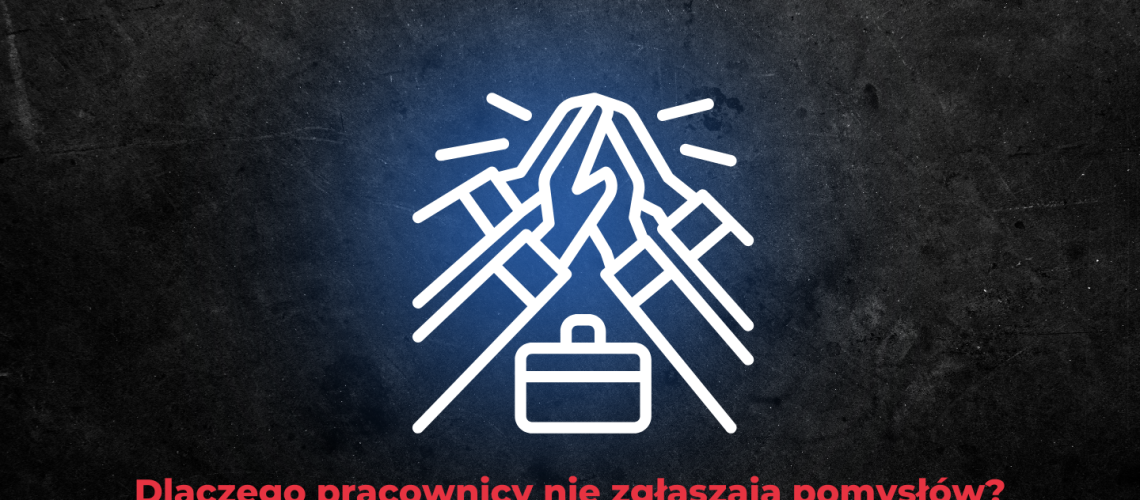Employee involvement in innovation processes is crucial to the development of any organization. Ideas from employees who face the company's challenges on a daily basis can contribute significantly to its success. Despite this, many companies face the problem of a low number of submitted ideas. It is worth considering why employees do not submit their ideas, and how to break down these barriers. In this article, we will present the 10 most common reasons why employees do not share their ideas, and suggest how to effectively overcome them by fostering a culture of innovation in the organization.
Table of Contents:
- Lack of adequate motivation to submit ideas.
- Fear of rejection and lack of recognition.
- Lack of clarity on the process for submitting ideas.
- Low confidence in the effectiveness of the ideas submitted.
- Lack of time to create and submit ideas.
- Stereotypes about "no need for innovation."
- Overly complicated or unintuitive tools for submitting ideas.
- An organizational culture that inhibits initiative.
- Fear of change and the unknown.
- Lack of proper tools to implement ideas.
- Summary.
1. lack of adequate motivation to come up with ideas
Motivation to share one's ideas is the primary factor affecting the number of submissions. Employees may not see the point in submitting ideas if they feel no real motivation to do so.
How to overcome this barrier?
It is worth introducing a system of rewards and recognition to reward employees for valuable ideas. Rewards can be both tangible and intangible - such as public recognition within the company, bonuses, or opportunities for career development.
2. fear of rejection and lack of recognition
Often, employees are afraid that their idea will be rejected and their commitment will not be appreciated. Fear of criticism can effectively discourage them from coming up with new solutions.
How to overcome this barrier?
It is useful to create an atmosphere in which all ideas are taken seriously and any rejection is justified in a constructive manner. Also, introducing anonymity in the idea submission process can reduce employees' fears.
3. lack of clarity on the process for submitting ideas
Employees may not know how to submit ideas or what the expectations are for the process. If the process is unclear or complicated, employees may choose not to submit their ideas.
How to overcome this barrier?
It is worth developing a simple, understandable and transparent process for submitting ideas. A good idea submission tool, such as Sherlock Waste, can facilitate the process by making it easy to submit, track and implement ideas.
4. low confidence in the effectiveness of the ideas put forward
Employees may feel that their ideas have no chance of being implemented, especially if they don't see any results from previous submissions.
How to overcome this barrier?
To encourage employees to submit ideas, it's a good idea to provide regular updates on the solutions implemented and the results. Transparency of the process, where employees see that their ideas have a real impact, will increase their involvement.
5. lack of time to create and submit ideas
In their day-to-day work, many employees may not have enough time to come up with ideas, especially if it is not part of their primary duties.
How to overcome this barrier?
It's a good idea to organize time for creative thinking and idea submission, such as through regular brainstorming sessions, special innovation days or incorporating idea submission into the employee evaluation process.
6. stereotypes about "no need for innovation"
Some organizations may operate in a culture where innovation is not seen as a necessity and change is viewed as risky.
How to overcome this barrier?
A culture of innovation should be promoted by the organization's leaders. If leaders show enthusiasm for new ideas and incorporate innovation into daily processes, other employees will also be willing to contribute ideas.
7. overly complicated or unintuitive tools for submitting ideas
If the idea submission tool is too complicated or difficult to use, it can effectively discourage employees from actively submitting their ideas.
How to overcome this barrier?
It's worth implementing a simple and intuitive platform that allows you to submit ideas quickly and conveniently. Sherlock Waste is a tool that facilitates the submission of ideas in a way that is accessible and affordable for every employee.
8. organizational culture that inhibits initiative
If an organization does not promote initiative and creativity, employees may feel that submitting ideas is unnecessary or even unaccepted.
How to overcome this barrier?
It is worth creating an atmosphere of openness in which all employees feel safe sharing their ideas. A culture that supports innovation starts at the top, so leaders should lead by example.
9. fear of change and the unknown
Change involves risk, and employees may be concerned that their idea will lead to hard-to-predict consequences that could make things worse.
How to overcome this barrier?
It's worth educating employees about the benefits of innovation and assuring them that change will be introduced gradually and in a controlled manner.
10. lack of proper tools to implement ideas
Employees may not submit ideas if they don't believe the company will be able to effectively implement their suggestions. Without the right tools and systems to implement ideas, the process can get bogged down.
How to overcome this barrier?
Implement a dedicated tool, such as Sherlock Waste, for submitting and managing ideas will help organize the entire process, and employees will know that their proposals have a real chance of being implemented.
11 Summary
Submission of ideas is a key element of innovation in an organization. Understanding and overcoming the barriers that discourage employees from sharing their ideas is essential to building a culture of innovation. By using the right tools, such as Sherlock Waste, and putting the right incentives and processes in place, organizations can effectively engage employees and reap the benefits of their ideas.
👉 Schedule a meeting now and start a revolution of innovation in your organization!






